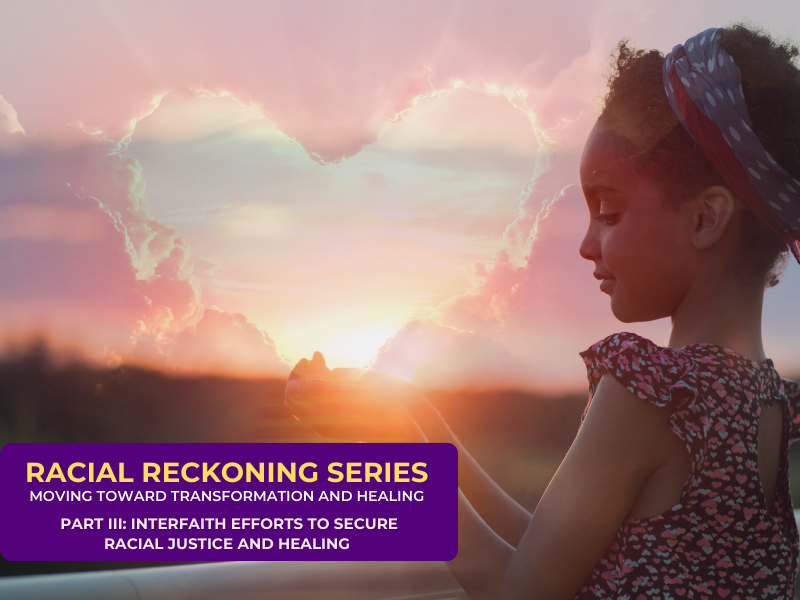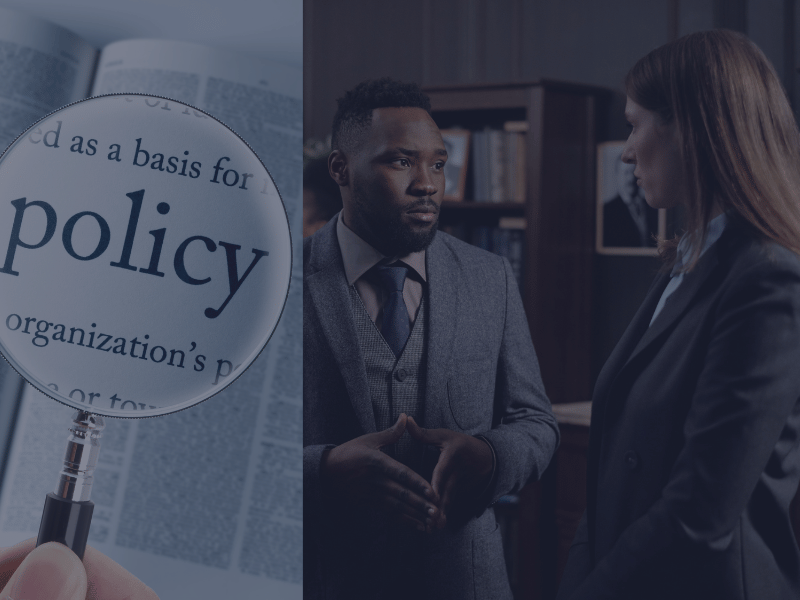Racial Reckoning: Moving Toward Transformation and Healing (Part III: Interfaith Efforts to Secure Racial Healing and Justice)
By Dr. Lawrence Jones II
60th Anniversary of the March on Washington
The 60th Anniversary of the March on Washington still addresses America's persistent challenge to racial inequality and injustice. The March on Washington was a massive protest march in August 1963, when some 250,000 people gathered in front of the Lincoln Memorial in Washington, D.C., to draw attention to continuing challenges and inequalities faced by African Americans a century after emancipation. It was also the occasion of Martin Luther King Jr.'s now-iconic "I Have a Dream" speech. The belief and power of religious and spiritual people uniting the country six decades ago is still a fundamental desire.
Multi-Media and Correspondence Association (MMCA)
The Multi-Media and Correspondence Association (MMCA) has provided insightful discussions with their latest series. Two weeks ago, MMCA featured its third episode, hosted by the founder of the BIPOC Exchange, David Morgan. A national reporter for Religion News Service, Adelle M. Banks, moderated the third series. Examines how important of a role faith communities continue to be in healing a fractured America. Historically, interfaith efforts were instrumental in ending apartheid in South Africa and undergirding the Civil Rights movement in America.
An increased awareness of racial justice is a focal point of the panelists. MMCA's BIPOCXChange (BXC), a metaverse platform that, among other services, hosts events and distributes content for its 350+ Black, Indigenous, and People of Color (BIPOC) media members and their audiences. Faith leaders, journalists, commentators, podcasters, and other creatives have informed and relevant perspectives on racial equity, healing, and transformation." The panelists discussing ways to move towards continuing transformation and healing are personally engaged in creating civic actions to increase awareness and galvanize support for civic efforts among Christian Jewish sects and other communities to create change, racial justice, and equity.
Guest Panelists for Discussion
The guest panelists consisted of Dr. Simran Jeet Singh, Executive Director of the Religion and Society program at the Aspen Institute, author of the national bestseller "The Light We Give: How Sikh Wisdom Can Transform your Life", the reverend Dr. Audrey Price who is the former executive minister for strategic operations with the southern New England Conference of the United Church of Christ and she is now the deputy director at the Aspen institute of religion and society program, and Rabbi Joshua Stanton of East End people in New York City and co-founder of the Journal of Interreligious Studies, and remarks by Dr. Charles Steele Jr. CEO and President of the Southern Leadership Conference. The final show segment is a call to action, cultivating ideas to improve efforts toward racial reconciliation.
Dr. Charles Steele Jr., CEO and President of the Southern Leadership Conference looks at people being excluded by another group of people as the root cause of inhumanity. Although race and gender are used to include or exclude people, the problem of exclusion causes conflict. The progress of these efforts, obstacles to creating widespread and enduring change, and how, in these times of increased unrest, faith leaders have come together to confront racism and "interrogate religion's role in making true racial justice a reality," according to Reverend Dr. Audrey C. Price.
MMCA asked four pressing questions to students interning on Capitol Hill
The MMCA asked four pressing questions to students interning on Capitol Hill in Washington, D.C. The youth often are the catalyst of political awareness and awakenings. The interfaith panelists also consider the responses to the questions by the Capitol Hill interns. They, too, weigh in on the comments by the Capitol Hill interns regarding their experiences and expertise. These four questions are also for the readers of this article:
1) What type of change in racial justice would you like to see?
2) When you think about the fight for racial equality in America, who do you picture leading that movement?
3) How would you feel if I told you that religious groups and religious organizations are moving towards achieving racial justice and equality in America?
4) Is there a way to get young people and religious leaders working together to create change?
First question
Regarding the first question: "What type of change in racial justice would you like to see? "interns Douglas Burnett, Sage Allen, Oladunni Oni, J. Hardy, Jordan Braithwaite, and Jordan Spencer collectively comment that the criminal justice system, voting rights, education, restorative justice as it relates to school suspensions and a concern by everyone regarding racial justice.
Dr. Singh gives his interpretation of the intern's response to the first video questions:
I'm reminded of a conversation with my daughter that's what's top of mind when she was almost four. I'm reminded of a conversation with my daughter; that's what was top of mind when she was after the killing of George Floyd.
Rabbi Stanton "I perceived a sense of frustration that was well worn into and very much with accuracy, he said. But why have we yet to make more progress, and why are we still fighting the same issues that our parents read and parents fought for? I think it is well placed, and at the same time, funny things like finishing the work are the last piece of that going from ideals to practice can be a lot more complicated than any possibly have imagined at the outset, so I think the frustration is well placed. We've got a lot of work, thank you very much."
Second question
The second question posed to the interns was, "When you think about the fight for racial equality in America, who do you picture leading that movement?" Interns Leianis Gunn and Jordan Spence commented on the role young people will continue to play, which is a role historically; young people have been the catalysts for change. Also, the interns expressed that more Black women will hopefully be recognized as leaders and contributors to change.
Dr. Audrey Price comments: I think that this video is spot on; first of all, it's sad that people are not aware of the work that is being done, and it's on us, the practitioners of the work, to make sure that people are aware the religious society program is leaning in quite heavily racial justice and religion and that is a collective of people from the Unitarian Universalist community to Sikh community, Muslim, Jewish, and those who don't adhere to any tradition, and Christians going to now elevate more of a public platform more awareness because there is strength in numbers and there's strength and understanding. I think that's one of how the media has been complicit in not helping to celebrate Reverend Jackie Lewis for her fantastic work and the national stage Reverend Tracy Blackman (for instance, in Charlottesville, VA, 2016).
Third question
The third question, "How would you feel if I were to tell you that religious groups and religious organizations are moving towards achieving racial justice and equality in America?" Interns J. Hardy, Jordan Braithwaite, Quinn Headen, and Marcelles Martin collectively feel that the media isn't doing enough to show the intersection of these religious groups and that there's a lot of work to be done regarding spreading awareness and controlling the narrative." There needs to be a joint effort between religious groups and non-Black people.
Dr. Audrey Price comments on how faith and Identity are linked. She stated, "Identity and faith are core principles and values that we hold very dear, and there are differences within particular faith traditions. From the Christian perspective, Christianity in and of itself is not monolithic. We have fought over and divided over, and in some cases, lives have been lost, so often when we come to the table ecumenically as Christians. I think all faith traditions and even those who don't adhere to a faith tradition can at least look at the human dignity of people."
Dr. Singh comments on how faith and religion have their ugly sides: "Unfortunately, religion has been used to justify racism and all sorts of nasty things in the world against humanity. American racism used the Bible to enslave and emancipate the freedom of black people in this country."
Rabbi Stanton: "I wholeheartedly agree. What I was wondering about was the context for all of those comments. I was nodding to myself like, yeah, everything they're saying is right. Every comment is rooted in context. I wish I knew the context. What gives you the most Hope that people across space and generations can work together is Hope we've done it before. Hope comes from history. We can do it again; the key question is what makes for the circumstances we will that is our task."
Fourth question
The fourth question asked: "Is there a way to get young people and religious leaders working together to create change?" Interns Oladunni Oni Jordan Spencer collectively express that if you can't bring young people to church, get the church to them. They also say interfaith leaders should be in the spaces where young people are. Lastly, listening is a crucial skill for young and old. Everyone can learn something.
Rabbi Stanton: "People might have seen at the end of the video wonder how you respond to some of these thoughts that both Dr. Price and these students have talked about so I love that Elie Wiesel quoted a pastor and it's Pastor Martin who as it turns out was my grandfather's pastor my grandfather was biologically Jewish enough he lost a considerable number of relatives in World War 2 and had to flee for his own safety but in order to make it in training society his parents and him in turn had converted to Christianity and so there is a remarkable resonance personally with Pastor Martin my grandfather received his first Bible from him and his orientation to religion came very largely from this justice focused on coalition building pastor in Germany and So what I love about what Dr Price described is sort of the religious inspiration for justice work and how we get it the center stage and I don't have many answers I do not pretend to be an expert but if there's one thing I do know from my family history and from grandfather’s Pastor that it became center stage after the fact at the time it was important for a lot of individuals after the fact it was instructive for generations yet to come and So what I wonder in terms of the staying power of religion is what is going to be informational in 25 years from now what are we going to take as heritage to pass on to our kids and their kids.”
Closing remarks
To the guest panelists: How has someone, perhaps surprisingly, been an ally of yours?
Dr. Singh: "I can give one that comes to mind. We were at a United Nations event a few months ago, and I had issues getting through security. Rabbi Stanton (Josh) was there with me and insisted on staying with me until I got through. And you know, it's not like him being there made the process go any more quickly. It wouldn't have made a difference with him being there whether I got through it or not, but just because he was willing to stay with me and hang out, it helps that we're friends. We had fun hanging out, but also, you know, him making a pointed statement to the security guard saying you know I'm not not going unless he goes nothing to them probably, but it meant a lot to me, so I just was meaningful."
Conclusion
The key takeaway from the discussion is that we are more alike than not alike. Does racial conflict and religious conflict have a financial benefit to media and journalism? Rabbi Stanton comments that there is a lot of press and media about what needs to be fixed in the interfaith communities, but more media coverage about the excellent work that comes from interfaith collaboration is required. All three interfaith leaders agreed that the interns who responded to the questions shared wisdom.
However, there needed to be more connection between the young intern's view of the world and perhaps the interfaith panelists. The interfaith panelists were disconnected from each other concerning some of the social nuances accompanying each leader.
For instance, Dr. Simran Jeet Singh commented on his faith perspective and how he is perceived by people who are not part of his community. Rabbi Stanton addressed how he is perceived first as a white person before being Jewish. Reverend Dr. Audrey Price commented on how her faith and Identity as a Black woman and a Christian play a role in how she perceives the world and how the world interprets her. In many respects, some of the nuances discussed by the panelists and how the interns answered their questions indicate much-continued work ahead. Also, a new approach to bridge the gap between young and old, religious, and non-religious, male and female, and white and Black must be applied compared to 60 years ago.
The Narrative Matters!
References:
View Full "Racial Reckoning: Moving Toward Transformation and Healing Part III"
(2023). March on Washington - Date, Facts & Significance (history.com)
(2023). https://bipocxchange.com/








